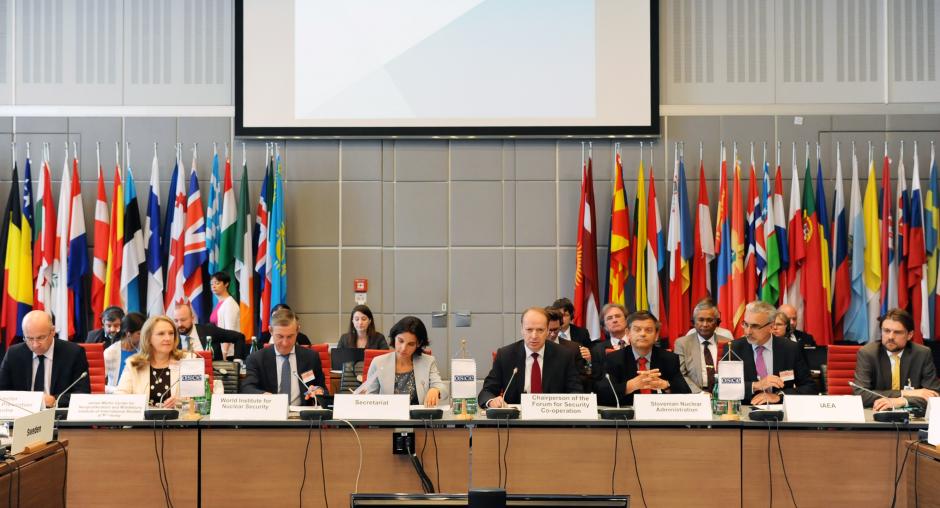OSCE Forum for Security Co-operation highlights the importance of nuclear security

VIENNA, 23 May 2018 – The importance of nuclear security was emphasized by speakers at today’s OSCE Forum for Security Co-operation (FSC) meeting in Vienna, held under Slovenia’s Chairmanship. The meeting was a follow-up to the OSCE Decision on the Update of the OSCE Principles Governing Non-proliferation, which designates the FSC as a forum for discussions on issues relating to the effective security of all nuclear materials and nuclear facilities in the OSCE area.
Ambassador Andrej Benedejčič, Chairperson of the Forum and Permanent Representative of Slovenia to the OSCE, opened the discussion by noting that two-thirds of all nuclear power plants in the world are located in the OSCE participating States. He added that OSCE participating States also account for 20 out of 30 countries with fully-fledged civilian nuclear programmes.
Ambassador Benedejčič emphasized the importance of managing radioactive sources, which must not fall into the wrong hands. "Many terrorist organizations pose a potential threat to civilian nuclear facilities and subsequently to the peaceful use of nuclear technology and its applications," he said.
Andrej Stritar, Director of the Slovenian Nuclear Administration, noted the importance of co-operation between power plant operators, the police and the military. He highlighted the lessons learned from a recent unannounced force-on-force exercise on the premises of the Krško nuclear power plant, and described the arrangements the country currently has in place for the event of an airplane crash or a cyber security attack. "Strengthening co-operation between civil and military authorities represents the main challenge," he said.
Juan Carlos Lentijo, Deputy Director General and Head of the Department of Nuclear Safety and Security of the International Atomic Energy Agency (IAEA) highlighted some of the Agency’s activities in this field. He discussed the IAEA's central role in strengthening the nuclear security framework, including the assistance it provides in work related to the Convention on the Physical Protection of Nuclear Material and its Amendment and UN Security Council Resolution 1540. "Like the OSCE, we promote international co-operation, which we see as an effective way to bolster nuclear security globally," he said.
Elena K. Sokova, Deputy Director of the James Martin Center for Nonproliferation at the Middlebury Institute of International Studies at Monterey, said: "The OSCE participating States own and host the lion's share of global nuclear facilities, materials and radioactive sources. Despite significant progress in strengthening nuclear security over the past 20 years, many challenges and vulnerabilities remain." She added that the OSCE participating States are at the forefront of emerging technologies that could have both negative and positive impacts on nuclear security and countering terrorism.
"The OSCE’s ongoing work to counter terrorism, secure borders, combat trafficking in arms and human beings, and protect against cybercrime are integral elements in addressing nuclear security challenges," she said. "Both the individual participating States and the Organization itself are well positioned to contribute to policy changes and work with various branches of government, industry and the professional community to enhance nuclear security."
Roger Howsley, Executive Director of the World Institute for Nuclear Security (WINS), spoke of the need for personnel with responsibilities for nuclear security to be demonstrably competent. He called on OSCE participating States to support the development of comparable, certified professional training courses for nuclear security as already exist for aviation security, and to encourage the IAEA to take a lead role.
He also said that WINS has become a member of the International Gender Champions Initiative and intends to identify and overcome the barriers to women's greater participation in nuclear security. "It is a fact that we need greater diversity to address the evolving threats," he said.
